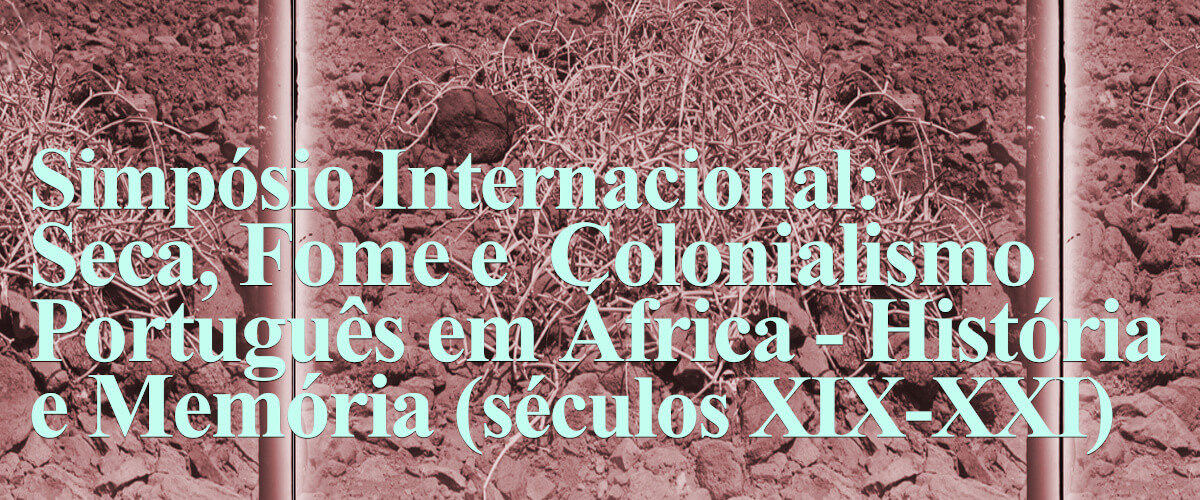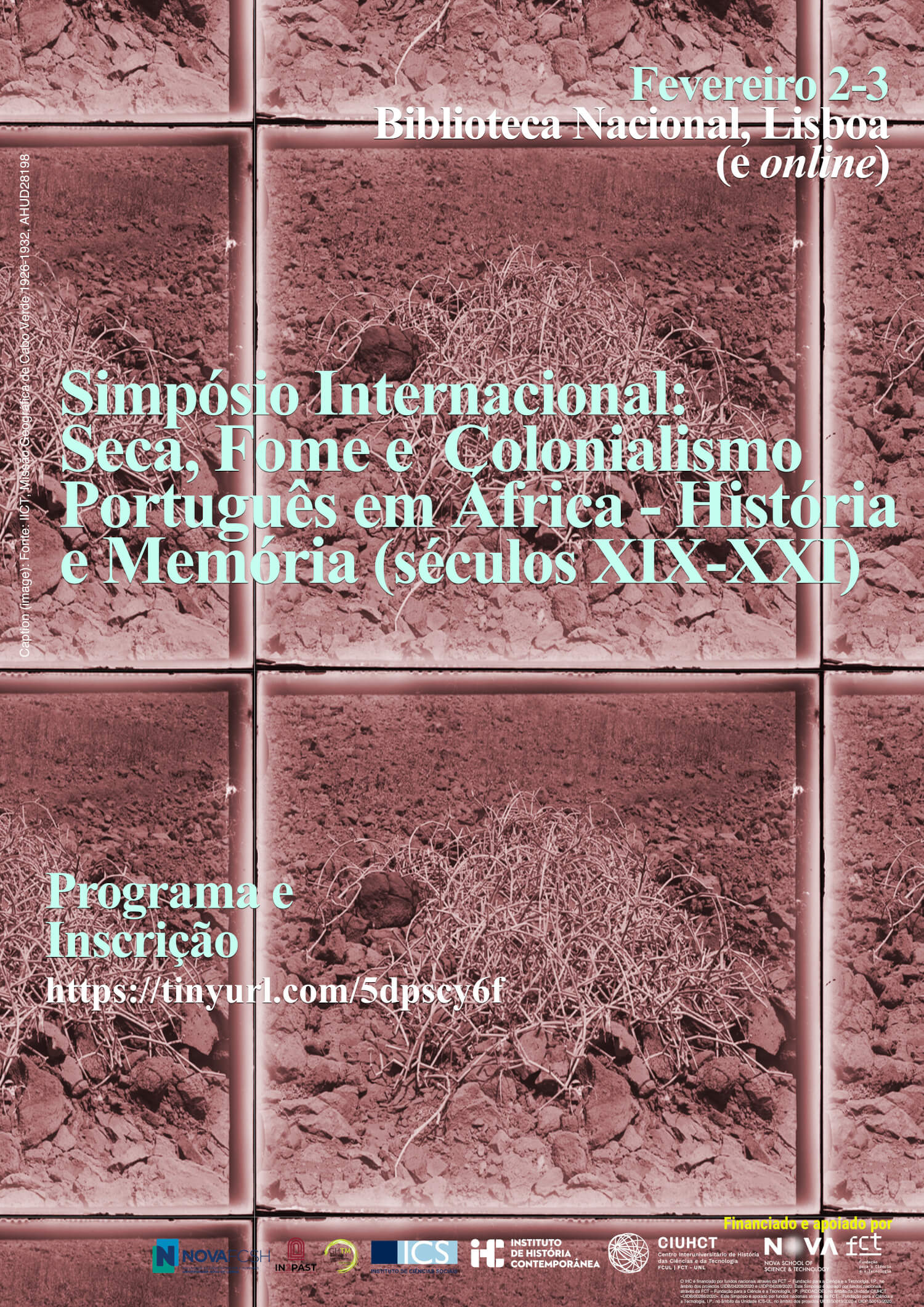fevereiro, 2023

Detalhes do Evento
Symposium on the contexts, the causes and the social, economic and ecological consequences of droughts and famines in former Portuguese colonial Africa. Drought, Famine and Portuguese Colonialism in Africa
Ver mais
Detalhes do Evento
Symposium on the contexts, the causes and the social, economic and ecological consequences of droughts and famines in former Portuguese colonial Africa.
Drought, Famine and Portuguese Colonialism in Africa
History and Memory (19th-21st centuries)
We are pleased to announce Drought, Famine and Portuguese Colonialism in Africa – History and Memory (19th-21st centuries), a two-day international symposium hosted by the Institute of Contemporary History (NOVA FCSH), Centro Interuniversitário de História das Ciências e da Tecnologia (NOVA FCT), Instituto de Ciências Sociais (UL) and Global Health and Tropical Medicine (NOVA IHMT), and to be held at the National Library of Portugal, in Lisbon, on February 2-3, 2023.
Over the last decades scholarly contributions have shown to what extent the African continent is particular vulnerable to drought and famine and how the combination of arid soils and irregular rainfall has had dramatic consequences for human and animal populations and ecologies. They have also demonstrated how (post-) colonial policies between the 19th and 21st centuries impacted upon African populations and their responses to these phenomena, but also how different scientific disciplines attempted to address the particular challenges that African environments posed. Not all regions and historical periods have however received the same scholarly attention, and there is still a significant knowledge gap when it comes to understanding the complex relationship between drought, famine and Portuguese colonialism in Africa.
This symposium aims to bring together graduate students and early-career and established scholars from different disciplines to discuss the contexts, the causes and the social, economic and ecological consequences of droughts and famines in former Portuguese colonial Africa. It also aims to promote a debate on the responses that populations and governments developed to drought and famine, while engaging with the relevant scholarship in the field of environmental history, climate history, social history, imperial history, the history of science, the history of health and migration history. It seeks to advance knowledge on drought and famine in these territories in the 19th and 20th centuries, both through site-specific and broader regional or comparative approaches. Recognising the importance of understanding in particular how famines were lived and are remembered in post-independence Portuguese-speaking countries in Africa, the symposium also seeks to discuss the question of memory and the lived and transmitted experiences of individuals and communities that faced great loss of life, hardship and trauma.
Call for papers
The symposium organisers invite papers centred on former Portuguese colonies in Africa that address, but are not limited to, the following topics:
• Sources for the history of drought and related climatic events;
• Local understandings and knowledge on drought and famine;
• Local agricultural, social and economic coping strategies to deal with drought and famine;
• The history of food systems, food security and of specific crops or practices used to prevent famine;
• Colonial responses to drought and famine and their impact upon affected populations;
• Demographic, social and economic consequences of drought and famine in the colonial and post-colonial periods;
• Drought, famine, human migration and uprooted populations;
• Public health, nutrition, drought and famine;
• Legacies of colonial responses to drought and famine in post-colonial Africa;
• Post-colonial responses to drought and famine and their impact;
• Memory of drought and famine in colonial and post-colonial Africa;
• Silences and knowledge gaps in the historiography of drought and famine in former Portuguese colonies in Africa.
Perspectives from environmental history, social history, imperial history, the history of science and the history of health, but also anthropology, migration studies and post-colonial studies, are welcome. We particularly encourage graduate students and scholars from Portuguese-speaking Africa to apply.
Official languages of the symposium: Portuguese and English
The symposium has no registration fee.
If on-going restrictions preclude the possibility of a face-to-face meeting, the symposium will be held in a hybrid or virtual format.
Submission process
Submissions in Portuguese or English should be sent to droughtandfaminesymposium2023@gmail.com by May 16, 2022 and will include:
Name(s);
Email contact(s);
Institutional affiliation;
A short biography of the author(s) (max. 100 words);
Title of presentation;
Abstract (max. 300 words).
Selected contributions will be part of an edited volume.
Timeline
May 16, 2022: Deadline for submission of abstracts;
June 30, 2022: Notification of decision on acceptance of abstracts;
July 15, 2022: Symposium preliminary programme.
Organisers
Pedro Aires Oliveira (IHC — NOVA FCSH / IN2PAST)
Cláudia Castelo (ICS — ULisboa)
Bárbara Direito (CIUHCT — NOVA FCT)
Philip J. Havik (GHTM — NOVA IHMT)
If you have any questions, please contact the symposium organisers at droughtandfaminesymposium2023@gmail.com
>> Download the call for proposals (PDF) <<
Tempo
2 (Quinta-feira) 9:00 am - 3 (Sexta-feira) 4:00 pm
Organizador
Several institutions

